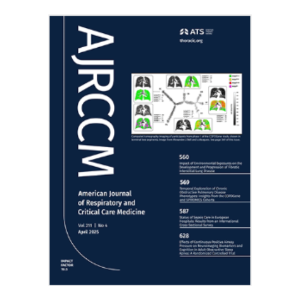 Congratulations to UCD School of Medicine’s Professor Adam Byrne, and all involved, on their recently published research in the American Journal of Respiratory and Critical Care Medicine. The paper is titled, ‘Select Airway Specialized Pro-Resolving Mediators Are Associated with Recovery from Non-Viral COPD Exacerbations’ and the work was done in collaboration with Imperial College London.
Congratulations to UCD School of Medicine’s Professor Adam Byrne, and all involved, on their recently published research in the American Journal of Respiratory and Critical Care Medicine. The paper is titled, ‘Select Airway Specialized Pro-Resolving Mediators Are Associated with Recovery from Non-Viral COPD Exacerbations’ and the work was done in collaboration with Imperial College London.
In COPD exacerbations the team found that those with lower levels of a specific molecule (RvD1) took longer to recover, especially from viral infections. The findings suggest that boosting these molecules could help speed up recovery and improve treatment for COPD flare-ups.
Abstract
Rationale: Recovery from chronic obstructive pulmonary disease (COPD) exacerbations is heterogeneous and has a profound impact on disease trajectories. Resolution of airway inflammation is an active process which may be driven by Specialized Pro-resolving Mediators (SPMs).
Objectives: To characterize the temporal change in SPMs in the sputum of COPD patients during COPD exacerbations, their association with exacerbation triggers and exacerbation recovery.
Methods: Participants were recruited from the London COPD Exacerbation Cohort between 01/11/2016 and 01/04/2018. Participants were reviewed at baseline, exacerbation onset, 1 week, 2 weeks and 6 weeks during their exacerbation recovery. Sputum, nasopharyngeal swabs, phlebotomy, quality of life questionnaires and spirometry were performed at each visit. SPMs were measured in sputum by liquid chromatography tandem mass spectrometry. Respiratory viruses were measured by quantitative PCR and bacteria by microbiological culture.
Measurements and Main Results: There were 68 exacerbations during the study period. Median time to symptomatic recovery was 21 days for viral exacerbations compared to 13 days in non-viral exacerbations (P<0.001). There was a significant increase in Resolvin D1 (RvD1) at exacerbation onset in bacterial exacerbations but not viral exacerbations. Lower levels of RvD1 were associated with prolonged respiratory symptoms during the 1-week and 2-week recovery time points. Exogenous RvD1 significantly reduced IL-6 and CXCL8 response to rhinovirus infection in COPD bronchial epithelial cells. Conclusions: There is a dynamic temporal change in airway SPMs during COPD exacerbations. Reduced levels of RvD1 were associated with prolonged respiratory symptoms. SPMs may be a potential therapeutic approach to promote exacerbation recovery.
Access online here.